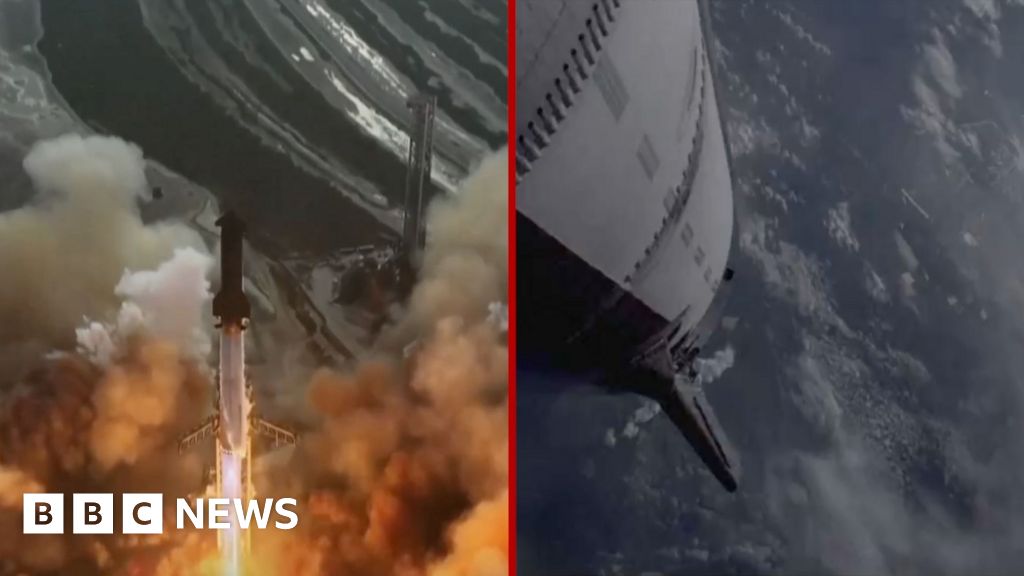Astronaut Shubhanshu Shukla, the first Indian to step onto the International Space Station (ISS), is currently on his return to Earth. A live feed illustrated the Axiom-4 (Ax-4) mission’s undocking from the ISS with its four-person crew on Monday, and a splashdown is anticipated within the next 24 hours. Shukla, a Group Captain, led the mission, which also included former NASA astronaut Peggy Whitson, Polish astronaut Slawosz Uznanski-Wisniewski, and Hungarian astronaut Tibor Kapu. He is now only the second Indian to enter space, following Rakesh Sharma's historic flight in 1984 aboard a Russian Soyuz.
The Ax-4 mission, facilitated by Axiom Space and partnered with entities including NASA, India's ISRO, the European Space Agency, and SpaceX, marked a significant moment for India’s ongoing advancements in space exploration. On its official X account, the ISS confirmed the crew's successful boarding of the spacecraft as the hatch was sealed. The Ax-4 crew is expected to splash down off the Californian coast, as confirmed by the Indian Science Minister, Jitendra Singh, with a predicted time of July 15 at approximately 15:00 India time (09:30 GMT).
In a heartfelt farewell broadcast from the ISS, Shukla emphasized the importance of continuing India's journey into space. "Even though now it is coming to an end, for you and me there is a long way to go. The journey of our human space mission is very long and difficult. But if we are determined, even the stars are attainable," he said. Echoing sentiments from India’s inaugural cosmonaut Rakesh Sharma, he expressed pride in India’s ambitions, asserting, "Today’s India looks ambitious. It looks fearless. It looks confident."
Initially scheduled for two weeks aboard the ISS, Ax-4’s mission lasted a few extra days. During their time in orbit, the crew executed an impressive 60 scientific experiments, with seven developed by the Indian Space Research Organisation (ISRO). This collaboration reflects ISRO’s strategic investment of 5 billion rupees (approximately $59 million) for Shukla's seat and training, aiming to bolster India’s aspirations for future manned missions. The agency has outlined its goal for the Gaganyaan mission, set for 2027, alongside an ambitious timeline that includes establishing a space station by 2035 and lunar expeditions by 2040.
Shukla, born on October 10, 1985, in Lucknow, joined the air force as a fighter pilot in 2006, accumulating over 2,000 flight hours across various aircraft types. In his reflective remarks prior to the mission, he characterized the preceding year as "transformative," conveying a sense of responsibility to represent a billion Indians in outer space. "I carry hopes and dreams of a billion hearts," he said, encouraging the nation to support the mission's success. As Shukla makes his return to Earth, India's space program stands poised on the brink of remarkable new achievements.
The Ax-4 mission, facilitated by Axiom Space and partnered with entities including NASA, India's ISRO, the European Space Agency, and SpaceX, marked a significant moment for India’s ongoing advancements in space exploration. On its official X account, the ISS confirmed the crew's successful boarding of the spacecraft as the hatch was sealed. The Ax-4 crew is expected to splash down off the Californian coast, as confirmed by the Indian Science Minister, Jitendra Singh, with a predicted time of July 15 at approximately 15:00 India time (09:30 GMT).
In a heartfelt farewell broadcast from the ISS, Shukla emphasized the importance of continuing India's journey into space. "Even though now it is coming to an end, for you and me there is a long way to go. The journey of our human space mission is very long and difficult. But if we are determined, even the stars are attainable," he said. Echoing sentiments from India’s inaugural cosmonaut Rakesh Sharma, he expressed pride in India’s ambitions, asserting, "Today’s India looks ambitious. It looks fearless. It looks confident."
Initially scheduled for two weeks aboard the ISS, Ax-4’s mission lasted a few extra days. During their time in orbit, the crew executed an impressive 60 scientific experiments, with seven developed by the Indian Space Research Organisation (ISRO). This collaboration reflects ISRO’s strategic investment of 5 billion rupees (approximately $59 million) for Shukla's seat and training, aiming to bolster India’s aspirations for future manned missions. The agency has outlined its goal for the Gaganyaan mission, set for 2027, alongside an ambitious timeline that includes establishing a space station by 2035 and lunar expeditions by 2040.
Shukla, born on October 10, 1985, in Lucknow, joined the air force as a fighter pilot in 2006, accumulating over 2,000 flight hours across various aircraft types. In his reflective remarks prior to the mission, he characterized the preceding year as "transformative," conveying a sense of responsibility to represent a billion Indians in outer space. "I carry hopes and dreams of a billion hearts," he said, encouraging the nation to support the mission's success. As Shukla makes his return to Earth, India's space program stands poised on the brink of remarkable new achievements.

















